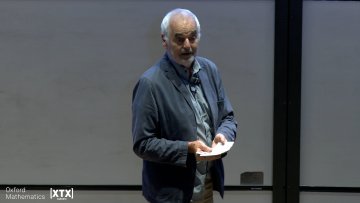We all have to live with uncertainty. We attribute good and bad events as ‘due to chance’, label people as ‘lucky’, and (sometimes) admit our ignorance. In this Oxford Mathematics Public Lecture David shows how to use the theory of probability to take apart all these ideas, and demonstrate how you can put numbers on your ignorance, and then measure how good those numbers are.
Congratulations to Ramón who won the prize for his article Mathematical Memory Machines.
The Graham Hoare Prize is awarded by the Institute of Mathematics & its Applications annually to Early Career Mathematicians for a brilliant Mathematics Today article.
The Vice-Chancellor’s Awards celebrate the dedication, courage, ambition and inspirational contributions of our people, and their commitment to excellence in pursuit of Oxford’s core mission (makes us sound good doesn't it?).
They recognise achievements and celebrate success – from our academics and researchers to professional, technical and support staff, whether they are in colleges, divisions, departments, central services, libraries, museums or elsewhere.


